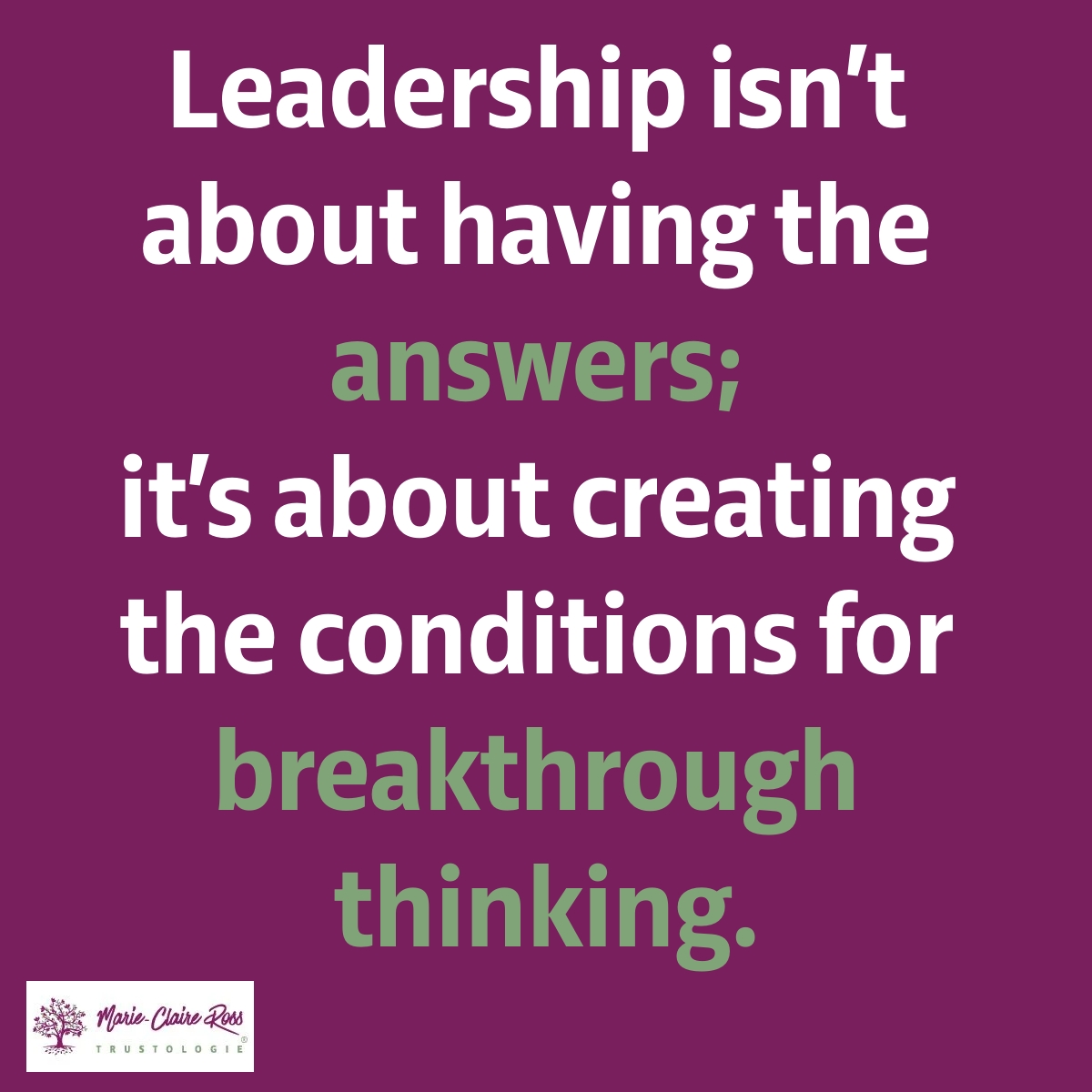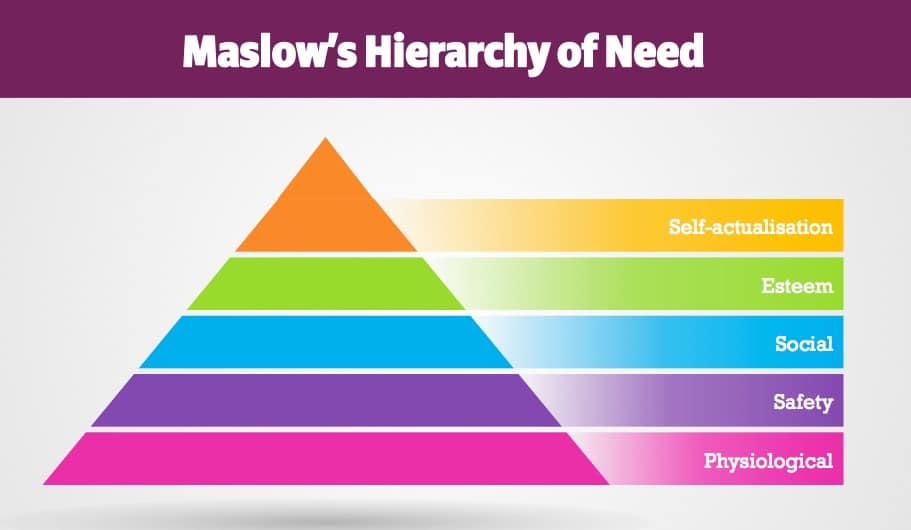8 min read
Beyond the "Why": 5 Coaching Secrets to Unlock Curiosity in Leadership
When my daughter was 17 months old, she discovered a superpower: the word “Why?”For the next two years, it was her response to almost everything.
Develop leaders, strengthen executive teams and gain deep insights with assessments designed to accelerate trust and performance.

Transform how your leaders think and perform with keynotes that spark connection, trust and high-performance cultures.

Explore practical tools, thought-leadership and resources to help you build trusted, high-performing teams.

Trustologie® is a leadership development consultancy founded by Marie-Claire Ross, specialising in helping executives and managers build high-trust, high-performing teams.

4 min read
Marie-Claire Ross : June 17, 2025

Another high-pressure management meeting has just closed with no clear actions. Targets missed. Heightened tension about employee bonuses still not finalised. The general manager leaves quickly, face unreadable, as she rushes to another meeting.
Sarah, an account executive gathers her notes, unfazed. “She’s under pressure. I can tell she’s carrying a lot. I’d be the same in her shoes.” She doesn't take the abruptness personally, or the lack of direction —she sees the chaos behind it.
Tom, meanwhile, frowns and throws his pen cross the room in frustration. “She barely acknowledged the issues. How are we suppose to get anything done if people are arguing about who drank the soft drinks in the fridge? We need to be talking about why so many balls are being dropped.” He sees it as cold, dismissive—even disrespectful of his time. “If leadership doesn’t care, why should I?”
Same behaviour. Same meeting. Two very different reactions.
This is the hidden power of upward empathy—the ability (or inability) to give leaders the benefit of the doubt. And it can shape everything from morale to retention.
So, what makes one team member lean into compassion while another leans out in frustration?
In my years of doing leadership coaching and interviewing employees, I have found that it is rare for employees to show genuine empathy toward their boss.
More often, they view their direct manager as an obstacle to navigate—or a gatekeeper they must influence to get what they want. Getting frustrated when their requests aren't sorted out in their favour.
What they often fail to recognise is that their manager is also under pressure, juggling competing demands from above and below. Understanding this isn't about excusing poor leadership—it’s about recognising that trust and collaboration flow in both directions. When employees begin to see their leaders as human beings doing their best in a complex system, it opens the door to stronger relationships, clearer communication, and a healthier workplace culture.
When I ask teams to write down the top three priorities their boss is focused on right now, it often stumps them. Even with the question repeated or written clearly in front of them, many people struggle to answer it.
Rarely does any employee get all three priorities correct.
This simple exercise reveals something powerful: leaders aren't clear in what are their most important priorities. While most employees don’t have a clear sense of what’s keeping their leader up at night —or what strategic pressures they’re navigating day to day. It highlights a disconnect that can quietly undermine alignment, collaboration, and impact.
When I ask teams to reflect on how they can create value—whether for their stakeholders, their team, or by supporting their boss’s priorities—it’s often met with hesitation. The ideas don’t flow immediately. And that’s completely understandable.
As humans, we’re wired to scan the world for threats and protect our own safety. What we’re not naturally wired for is turning inward to ask, “How might my actions help improve this situation?” It takes intentional effort to shift from self-preservation to value creation.
Yet, this is the secret to being a valuable employee that makes a significant impact.
In the book, Impact Player by Liz Wiseman, she talks about the need for employees to look beyond themselves and define define value through the eyes of their stakeholders solving unmet needs.
Wiseman defines upward empathy as understanding your boss's job, their boss's job and the fundamental job to be done.
To do this well, requires looking at the situation both cognitively and emotionally:
Also called "intellectual empathy," this is the ability to understand another person’s thoughts, beliefs, or viewpoint.
It’s about asking: “What might they be thinking right now?” It helps with problem-solving, communication, and reducing conflict.
Example: You imagine why your boss is stressed by considering their deadlines or stakeholder pressure.
Also known as “affective empathy,” this is the ability to feel what another person might be feeling, or at least to emotionally resonate with them.
It’s about asking: “What might they be worried about right now?” or "What is making their job hard?" It fosters compassion, trust, and psychological safety. Example: You sense your boss' anxiety and respond with kindness or reassurance.
Understanding both emotional and cognitively what you boss is going through isn't enough on its own.
While Sarah in the above example, emotionally understood her boss' situation and cut her some slack (unlike Tom), it didn't compel her to take any action to help her out (or defend her from Tom's frustrated remarks).
I often come across employees who understand the constraints their boss is operating in, yet few take intentional action to support them. And that's where we can add so much value - not only to our boss, but our team, our organisation, but even ourselves.
As Wiseman says in her book, we need to bring both aspects of empathy together and work out how to take action to help. We can do this by asking: "What do they need from me to be successful?" or "How can I make their job easier or more rewarding?" Even better is when we ask our boss "I can see that you are distracted. What is the most helpful thing I can do right now to reduce your workload/stress?"
This type of thinking encourages us to see the individual agendas at play that are guiding leadership behaviours. In fast-moving environments, the stated agenda is not often the real agenda. Things move so quickly that leaders themselves aren't clear, or don't brief their team with the new updates.
Wiseman in her research found that high-impact contributors figure out the ever-changing organisational agenda on their own, rather than wait for direction or expect their needs to be served immediately. They observe where leaders are focusing their efforts, what topics are being talked about, what is gaining traction, and what achievements are being recognised. And they calibrate what they do to match the hidden agenda.
But they don't just assume they have worked out the real agenda. They check in with their boss and share what they think is important now to ensure they are on the correct path.
We always hear about the need for empathetic leadership, not fully understanding that it goes both ways. Employees have to be empathetic as well. Empathy needs to be upwards, downwards and all around. Yet, so often I hear people lamenting about no empathy in their own direction, while they do not give it outwardly themselves.
If you want to make a bigger impact in your job, upward empathy is just as important as downward empathy. Not only does it improve your career opportunities, but it also improves team performance, boosts our creativity and enhances meaning and engagement.
Experiments revealed that when employees view their work as helping others, they experience a stronger sense of meaning—leading to improved well‑being and productivity.
So the next time your boss ignores your request or misses a deadline, ask them how you can help them. You will be surprised at how much you will not only improve their well-being, but your working relationship as well.

8 min read
When my daughter was 17 months old, she discovered a superpower: the word “Why?”For the next two years, it was her response to almost everything.

11 min read
I have a friend who often finds herself at the mercy of her emotions. Recently, she called me to rehash a confrontation she’d had with a group of...

9 min read
True leadership presence isn’t a performance or a set of charisma hacks; it is the felt experience of who you are being in the room. By cultivating...

Imagine a management team that has had a tough few years - dwindling revenue, archaic systems and processes that need an expensive overhaul and...

Call it fear of looking stupid or fear of not fitting in right, for some reason we when work in corporate jobs, we speak like, well, robots.

The pace of change within most organisations is accelerating. It’s now commonplace for companies to be restructuring, changing their business model,...